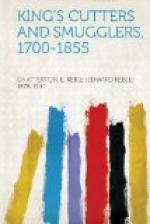“I sees him,” answered Davey as the craft was approaching the shore. By this time, also, there were ten or twelve men coming towards the officers, and Bartlett managed to run down to the shore, shouting “Keep off!” “Keep off!” as loudly as he could. The officers ran too, but the boat turned round and put off to sea again. In the course of a few minutes there rose up a large fire on the cliff, about a hundred yards from where the officers were. It was another signal of warning to the boat. For Bartlett, having got away from the officers, had doubtless lit this, since it flared up near to where he was seen to run. The officers remained on the coast until daylight, and then launching their boat rowed a little way from the shore, and found a new buoy moored just by the spot where the lugger had been observed to turn round when hailed and warned. It was clear, on examination, that the buoy had not been in the water many hours, and after “creeping” along the sea bottom hereabouts they brought up sixty kegs, which were also quite new, and had evidently only been sunk when Bartlett sung out his warning. The latter was again arrested, and found guilty when subsequently tried. So again Bartlett had to retire from smuggling.
It happened only a few weeks before this incident that a seaman named Willis was on shore with his officer. Willis belonged to H.M.S. Severn, which was moored off Dover for the prevention of smuggling. The officer was a naval midshipman named Hope, stationed ashore. Whilst on their duty they began to notice a man, whose name was William Clarke, near Chalk Fall, carrying a basket of nets and fishing lines. For a time both Willis and Hope took shelter under the Chalk Cliff as it was raining, but presently Willis separated from his officer to go to his appointed station. It occurred to him that Clarke appeared to be unnecessarily stout, and he was sure that he was trying to smuggle something. Willis went up to him and said he intended to search him, to which Clarke replied, “Certainly.” He admitted he had some liquor there, but he hoped Willis would take no notice of it. The seaman insisted that he must take notice, for if it turned out to be foreign spirits he must seize it: whereupon Clarke flung down a couple of half-crowns and asked him to say nothing about it.
Willis again protested that he must see what the man had beneath his gabardine. But at this Clarke took a knife from his pocket and cut a large bladder which he had under his clothes, containing half a gallon of spirits, and a spirituous liquor poured out on to the ground. Willis put his finger to it and found that it was foreign brandy. But the amusing legal aspect of this incident was that this foreign liquor could not be seized, nor could the man be prosecuted for having it, and it could not be condemned. But Clarke had indeed destroyed that which he had so early brought safely home. This was just one instance of the good work which the Coast Blockade was performing, Willis and other seamen being landed every night from H.M.S. Severn to act as guard at different points along the coast.




